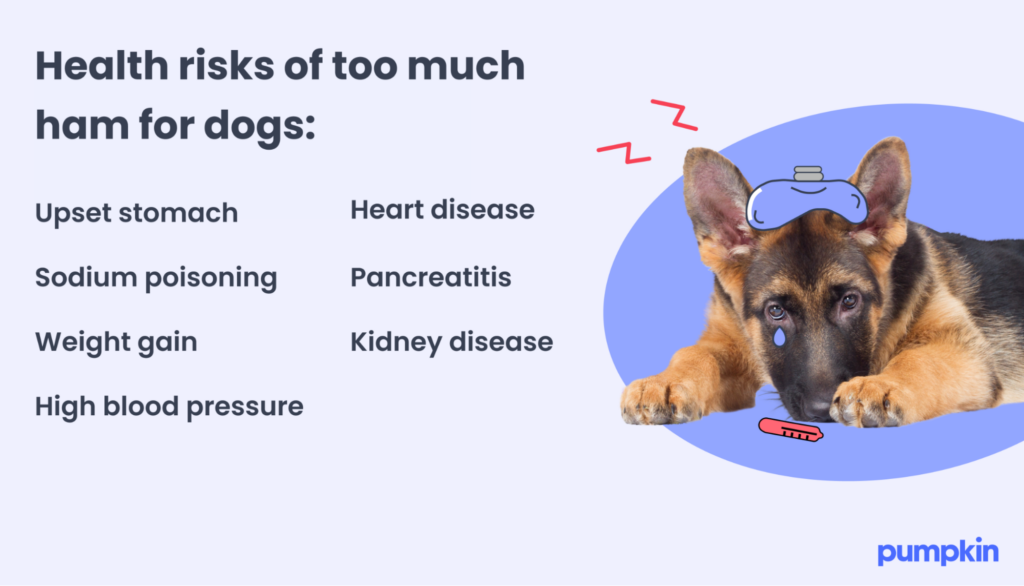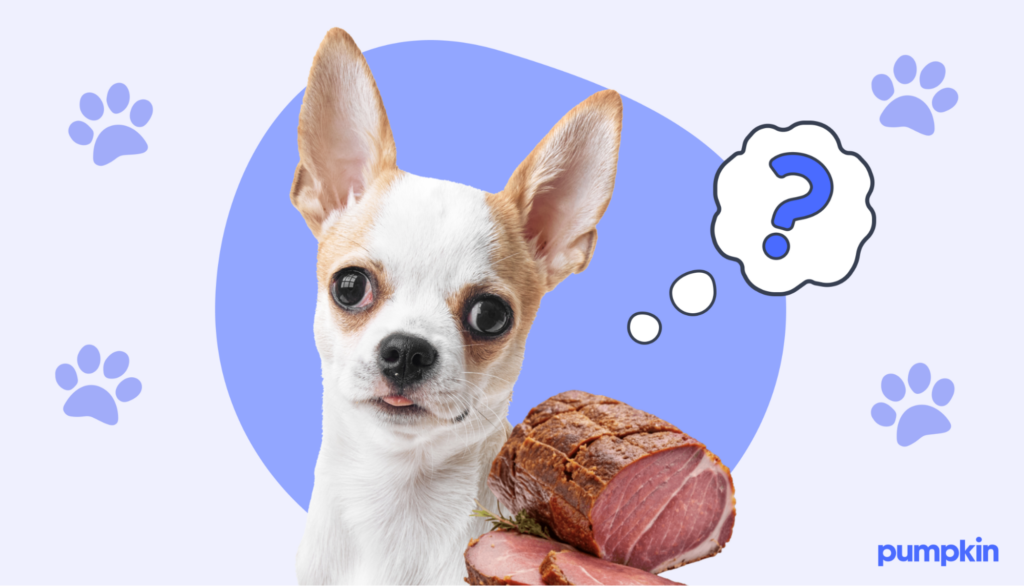Key Points
- No, dogs should not eat ham due to its high salt and fat content.
- Ham is not toxic for dogs, but regular feeding can lead to obesity and serious health problems like pancreatitis.
- If your dog eats a large amount of ham, watch out for signs of digestive upset or salt poisoning.
Sweet and savory, ham is a favorite meal during lunchtime, holiday seasons, and family gatherings. No matter the occasion, your dog is surely eyeing that slice of ham on your plate, leading you to question if it’s safe to sneak them a snack under the table.
Well, we have good news and bad news. The bad news is that dogs shouldn’t eat ham due to its high salt and fat content.
And the good news? A small piece won’t harm your pup — and you’re still a good pet parent if you choose to share the occasional bite with a really good dog. However, making it a part of your pup’s regular diet can lead to dangerous health conditions like obesity and pancreatitis.
Learn more about why feeding ham to your pup isn’t a good idea and healthy alternatives that deserve a spot in their food bowl instead.
Nutritional content of ham for dogs
An adult dog’s balanced diet should include at least 18% protein and 5.5% fat, with as little as 0.08% sodium.
So, how does ham stack up?
While ham might be high in protein, with 3.18 grams per slice, you should be concerned by the high sodium content. A single slice of ham contains around 167 milligrams of sodium, which is too much for your pooch.
A tiny piece given as an occasional treat? Sure, no problem. But making ham a regular part of your dog’s diet is a no-go.
The risks of dogs eating ham
Ham — especially in large quantities — can pose several risks to dogs.
With baked ham, bone splinters are a choking hazard. They could also get lodged in the intestinal tract, causing tears and blockages known as bone impactions.

Ham can cause other problems such as:
- Gastrointestinal distress
- Sodium poisoning
- Kidney disease
- Weight gain and obesity, which can exacerbate the symptoms of arthritis
- Risk of high blood pressure and heart disease with long-term consumption
- Pancreatitis
What to do if your dog eats ham
Before you start panicking, you should know that a small piece of ham isn’t likely to cause any serious issues. However, if your dog has pulled your honey-baked ham off the counter and gorged themselves, you may need to contact your veterinarian. Watch closely for signs of stomach upset or sodium poisoning — lethargy, disorientation, muscle tremors, seizures, shortness of breath — within a few hours of ingestion.

Healthy alternatives to ham for dogs
If you’re looking for alternatives to fatty meats like ham, consider lean cuts of meat from chicken, turkey, or salmon. These meats are lower in salt and fat while still being a good source of protein, making them a healthier alternative to sodium-drenched ham.
There are still many human foods that are safe for dogs to consume, including:
- Carrots: a source of vitamin A that also helps remove plaque from your dog’s teeth
- Apples (without seeds): a sweet treat that’s full of vitamins A and C
- White rice (plain): easy to digest and contains vitamins, minerals, dietary fiber, and carbohydrates
- Pumpkin: full of soluble fiber, vitamins C, A, and E, and minerals
- Green beans: loaded with vitamins C, A, and B6, potassium, magnesium, and iron
- Watermelon: a great source of vitamin C
- Popcorn (plain): a low-calorie snack with few downsides
- Blueberries: packed with dietary fiber, antioxidants, vitamins C and K, and minerals
- Tuna: a great source of protein and healthy fats
Of course, you should always consult with your veterinarian before introducing new foods into your dog’s diet.
The bottom line: Can dogs eat ham?
We advise against feeding ham to dogs. While it’s not toxic, its high salt and fat content can lead to salt poisoning and long-term health issues, ranging from obesity and high blood pressure to pancreatitis and kidney disease. The next time your good boy or girl is begging for a treat, reach for lean meats like chicken and turkey instead of ham.
If your pup is known to steal scraps from the dining table, then you’ll want to be prepared for future accidents. A pet insurance plan can help you afford the best care by covering a portion of eligible vet bills in the future, letting pet parents focus less on cost and more on care.
FAQs
- https://www.aafco.org/wp-content/uploads/2023/01/Pet_Food_Report_2013_Annual-Appendix_B.pdf
- https://fdc.nal.usda.gov/fdc-app.html#/food-details/746952/nutrients
- https://www.akc.org/expert-advice/nutrition/can-dogs-eat-ham/
- https://pubmed.ncbi.nlm.nih.gov/25586802/
- https://www.petobesityprevention.org/2022
- https://pubmed.ncbi.nlm.nih.gov/8141489/
- https://www.petpoisonhelpline.com/pet-safety-tips/is-table-food-poisonous-for-dogs/




